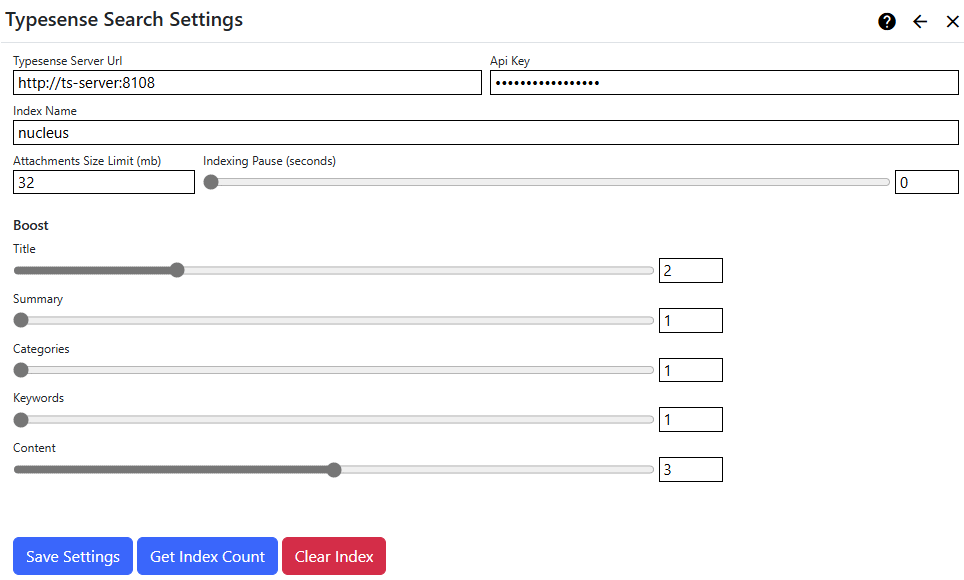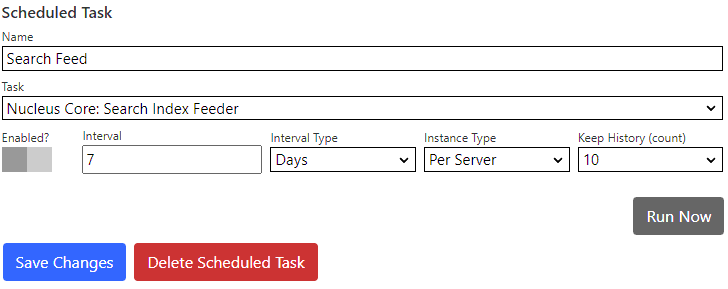Typesense Search Extension
The Typesense Search extension provides a search index manager and a search provider (it both feeds the search index and retrieves search results).
You need a Typesense Search server to use the Typesense Search provider. For improved search results, you can optionally use a Tika server for file data extraction. You can install Typesense on your own server, or you can use the Typesense Cloud hosted service.
How it works
Nucleus
The Nucleus search system is built to support a variety of search services. The Nucleus search system consists of:
- Search meta-data providers: Extensions and core components of Nucleus implement meta-data providers, which provide data to the search indexing system. The core includes meta-data providers for site pages and files, and modules (like Documents and Forums) also publish their data by implementing their own meta-data providers. Pages and Folders have a "Include in search" setting to control whether they are included in the search index.
- Search index managers: Search extensions may implement a search index manager in order to populate an index. All configured search index managers receive all data from meta-data providers, and use meta-data however to populate their index. Some search extensions (like a Google custom search) don't have a search index manager and just provide a search provider.
- Search providers: Search providers retrieve search results from an index.
- The Search Module presents a search user interface so that users can perform a search, and view results.
- A search feeder scheduled task runs periodically. It calls all meta-data providers and passes their data to all search index managers.
Typesense Search
The Typesense Search extension provides a search index manager and a search provider, so it can populate your Typesense Search index, and query it for search results.
The Typesense Search extension settings are accessed in the Manage control panel.
When creating each index entry, the Typesense index provider:
- Calls your Tika server to extract plain text from file and other content, if you have installed and configured the Tika Server Converter extension for Nucleus to use a Tika server.
- Splits large content into chunks, so that vector embedding works better.
- Creates a vector embedding using the gte-large language model. Vector search and embedding are built in to Typesearch.
Settings

| Typesense Server Url | Enter the domain name or address of the Typesense Search server, including the scheme (http: or https:) and port. The default port is 8108. |
| Index Name | Enter an index name (in Typesense this is called a 'Collection Name'). The index is created automatically. |
| Api Key | Enter your Typesense API key. |
| Attachments Size Limit | You can specify an upper size limit (in mb) for documents which are submitted to the index. Documents which are larger than the size limit will have index entries containing meta-data only. To specify no limit, enter zero (0). |
| Indexing Pause | You can specify an pause in-between each indexing operation (in seconds), or zero for no pause. See additional information below. |
| Boost Settings | You can increase or decrease the boost for some search index fields. This influences the relevance of a document when you are searching, and results are sorted by relevance. The default boost value for all fields is 1. |
| - Title | Boost the page title, or the file name for files. |
| - Summary | Boost the page summary (not relevant for files). |
| - Categories | Boost categories. Page and file index entries do not currently set categories, but modules may set one or more categories for an index entry. |
| - Keywords | Boost page keywords (not relevant for files). |
| - Content | Boost the page or file content. If you are using Tika for content extraction, your index will contain the content from many file formats, including office documents and PDFs. |
The first time that you create a Typesense index, it may take a long time (several minutes), and you may get a timeout error message. This is because Typesense automatically downloads the 'gte-large' model that we use for vector embeddings if it not already present. It is a good idea to click the 'Get Index Count' button - which has a side-effect of automatically creating your index - to initiate the download process right away instead of waiting for the search feed task.
Indexing Pause
The indexing pause is used to reduce the load on your server during search feed processing. In some hosting environments, the search feed can exhaust memory, processor or TCP connection limits.
Pausing in-between submitting each index entry gives the server time to free up resources. This setting makes your search feed take longer to run, but can prevent it from failing. If you are hosting in an Azure App Service, this setting is important, as Azure automatically stops and restarts applications which have too many TCP ports open.
If you are hosting in Azure, try an indexing pause of 2.5 seconds. This will reduce the number of HTTP requests to 24 per minute, which gives the Azure App Service time to release unused SNAT ports. For a search index with 5000 entries, this would increase the search feed duration to around 3.5 hours.
Tools
| Get Index Count | Displays the number of entries in the index, for use when troubleshooting or verifying that your server is functioning correctly. |
| Clear Index | Use the Clear Index function to delete your index. It will be automatically re-created the next time that the index feeder task runs. |
Search Feeder Scheduled Task
Nucleus has a built-in Scheduled Task which collects data from all installed search meta-data providers, and submits that data to all installed search index managers. You must create and enable the scheduled task in the
Settings/Schedulercontrol panel as it is not enabled by default.

Supported Capabilities
The Typesense Search provider supports all of the capabilities of the Nucleus Search Module except for result score display. A future update to Typesense may provide this capability.
| Capability | Supported? |
|---|---|
| Search Suggestions | Yes |
| Filter By Scope | Yes |
| Maximum Page Size | 250 |
| Meta-data Display | |
| - Categories | Yes |
| - Result Score | No |
| - Size | Yes |
| - Published Date | Yes |
| - Resource Type | Yes |
| - Matched Terms Highlighting | Yes |
